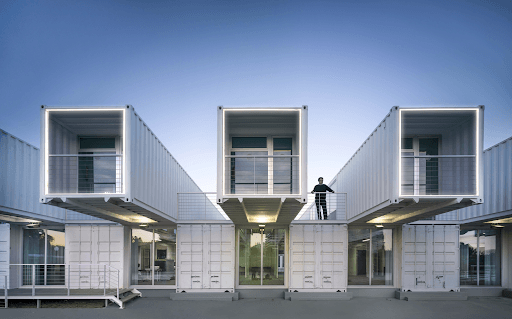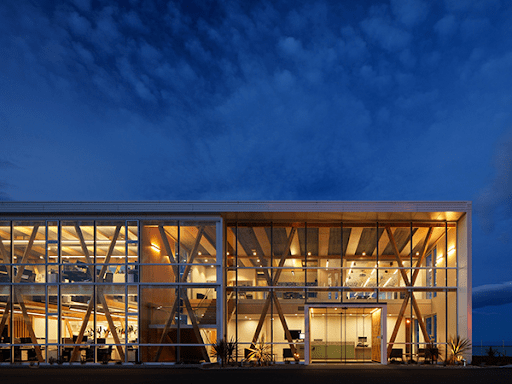What Is Modular Construction?
Modular construction is a method of building in which sections are manufactured off-site and then transported to the building site. The method offers numerous advantages, including reducing the costs of labour, materials, and construction management. Let’s explore the many more sustainability and process benefits of modular construction.

Benefits of Modular Construction
There are many sustainability and process benefits of modular construction, such as the production of less waste and the recycling of materials. This article touches on such and more of those benefits as well as other benefits, including modular construction cost savings.
Here are five benefits of modular construction for businesses:
- Uses Less Energy
With modular construction, buildings can be assembled more efficiently in a controlled factory setting. This process uses less energy and results in shorter construction times, helping save money on energy costs down the road. Additionally, environmental impact is reduced as machine learning algorithms optimise energy usage during construction. To further improve the sustainability of modular buildings, professionals can install structural insulated panels, which help to regulate internal temperature and reduce the need for heating and air conditioning.
- Reduces Construction Waste
With traditional construction methods, many materials often go to waste and end up in landfills, which can be detrimental to the environment. However, modular building methods can help reduce this problem. By producing individual modules in factory settings, there is better control over inventories and less waste overall. Additionally, leftover materials can be recycled for future projects, reducing the amount of waste in landfills.
- Promotes Safer Construction
Construction site injuries can often lead to unexpected indirect costs. For instance, when injured workers cannot perform their duties, it can cause construction delays that throw off a project’s budget. This is why worker safety is essential for their well-being and for keeping your project on track financially. Luckily, modular construction is much safer, as some of the work takes place indoors. This reduces the risk of falls and other accidents and protects workers from terrible weather conditions. As a result, modular construction can help you stay on budget and save lives.
- Improves Air Quality
The benefits of modular construction extend beyond the building process itself. One of the key advantages is the impact on indoor air quality. Because modular construction takes place in a factory setting with dry materials, there is no risk of high moisture levels being trapped in the framing materials. This can eliminate many of the indoor air quality issues that are often found in newly constructed businesses.
- Provides Greater Reusability
There are many environmental benefits of modular construction, and reusability is one of these advantages. With traditional construction, you rely heavily on newly milled lumber, which can be expensive and energy-intensive. But with modular construction, the modules can be refurbished and reused, which helps reduce demand for raw materials and minimise the cost of constructing a new building.
Trends in Modular Design

With all the benefits associated with modular construction, it’s unsurprising that it’s gaining popularity and will likely continue to do so in the coming years.
Here are the top five trends in modular construction:
- BIM Technology
The future of construction lies in digital technologies like building information modeling (BIM). This system allows contractors, architects, and engineers to develop 3D versions of construction projects, ensuring that all aspects are considered before proceeding with the build. BIM technology will grow in modular construction as it provides insight into a project at all key stages.
- Augmented Reality
Augmented reality (AR) can provide many benefits for construction projects, including improved planning and coordination. It can give project managers a better understanding of how on-site work should be planned before modules are transported to the location. This technology can also help ensure that all specialists working on the project have an accurate visual representation of the building. Ultimately, using AR in construction can lead to more efficient and effective project management.
- Digital Management Technologies
Digital management tools are essential for running a successful modular design construction project. They help you coordinate teams, manage assets, and communicate effectively to avoid disruptions. With these tools, you can easily keep track of multiple projects at once and make the best decisions for your business.
- Commercial and Residential Crossover
As pressure mounts to build residential homes quickly, cheaply, and safely, modular construction is becoming an increasingly popular option. Though primarily used in commercial sectors up till now, individuals are also choosing this method for building their homes. This trend will likely continue as more options become available to consumers.
- Luxury Modular Designs
Luxurious modular designs are the latest trend in construction. This form of construction involves using prefabricated structures with unique designs that incorporate luxurious materials. These materials include cross-laminated timber, recycled materials, and other sustainable products. The design elements are eco-friendly and focus on the well-being of those working in, visiting, or occupying the building.
The Bottom Line
As the popularity of modular construction grows, so does the recognition it receives from inside and outside the construction industry. This is an exciting time to be involved in the industry — it’s efficient, cost-effective, and environmentally friendly. This is why modular constructions are ideal for the building of childcare facilities, office buildings, healthcare facilities and classrooms.
For more information on modular construction, contact us. We are committed to providing sustainable and eco-friendly construction solutions. Join us today and let’s build a greener tomorrow!
